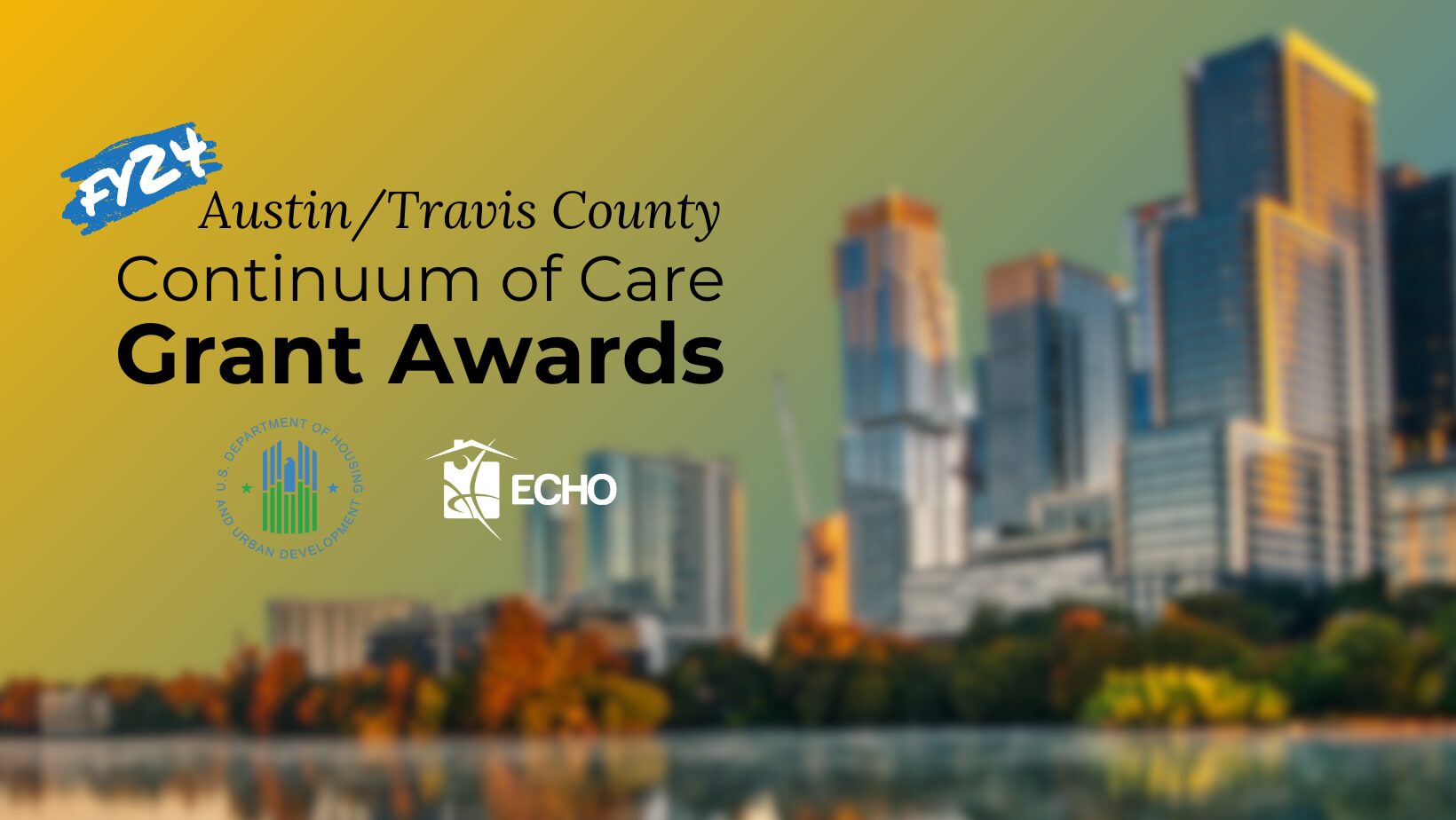$14 Million Awarded to Austin/Travis County HRS Partners through Federal CoC Program
The awards are the most our community has received from the Continuum of Care program and increase the federal investment in our community’s response by $2 million
AUSTIN, Texas (Feb. 3, 2025) – Organizations in Austin/Travis County that provide housing and supportive services to people working to end their homelessness will receive nearly $14 million from the U.S. Department of Housing and Urban Development (HUD), the agency announced last month.
The awards – totaling $13,997,236 – are the most our community has received from the Continuum of Care (CoC) program, an increase of about $2 million from the previous year. Grants will directly fund 16 housing, supportive services, and system coordination projects at eight organizations across Austin and Travis County:
- Caritas of Austin
- Ending Community Homelessness Coalition (ECHO)
- Housing Authority of the City of Austin (HACA)
- Housing Authority of Travis County (HATC)
- Integral Care
- LifeWorks
- The SAFE Alliance
- Sunrise Community Church (Sunrise Navigation Center)
Three new Permanent Supportive Housing (PSH) projects were funded as part of the awards. These new housing options will provide long-term stability for youth and young adults (LifeWorks), survivors of domestic violence (The SAFE Alliance), and people living with serious mental illnesses (Integral Care). The three new PSH projects add to a slate of housing developments that either opened or broke ground in 2024, including Espero Rutland (Caritas of Austin), Pecan Gardens (Family Eldercare), Seabrook Square II (Integral Care), and Cairn Point Cameron (Caritas of Austin).
Projects like these are central to growing our Homelessness Response System (HRS) to meet everyone’s needs: Thursday, City Council voted to adopt a new system model, included in ECHO’s 2024 State of the HRS report, that outlines investments necessary to effectively end homelessness in the next ten years. The vote means this model will serve as a guide to growing our HRS to ensure: 1) everyone currently unhoused has a place to live paired with individualized supportive services, and 2) anyone who falls into homelessness in the future has a quick and effective path back to stability. The model calls for 4,175 new units of PSH, along with 550 additional shelter beds and 2,355 Rapid Re-Housing (RRH) units.
Thirteen previously-awarded projects were granted CoC renewal funding to continue to provide housing through PSH and Rapid Re-Housing (RRH) models, expand access to the Coordinated Entry System people use to get connected to our Homelessness Response System (HRS), and coordinate the HRS to achieve person-centered, data-driven solutions.
“We are grateful to all of the agencies funded by the Continuum of Care grant, who work tirelessly and passionately to meet the needs of our unhoused neighbors,” said ECHO Vice President of Homelessness Response System Strategy Kate Moore. “Federal funding from HUD, through the Continuum of Care grant, ensures essential services can continue in our homelessness response system and that can’t happen without our community partners. In addition, the new funding to Lifeworks, Integral Care, and the SAFE Alliance will house and support hundreds of people who are the most vulnerable in our unsheltered community in PSH projects throughout the Austin/Travis County community.”
The awards also include funding for supportive services like case management and healthcare. These services, provided in a tailored way based on the needs and wants of folks ending their homelessness, are vital to ensuring people can remain in their homes long-term and not return to the street. CoC awards are a sustainable way to provide supportive services and build on the City of Austin’s commitments in the last budget cycle to provide similar financial support.
The awards to Austin/Travis County providers are part of the nearly $3.6 billion in assistance HUD will provide to communities across the country this fiscal year. See all the awards by state and locality here.
“We are grateful to HUD for recognizing the critical work being done by local organizations to address homelessness in Austin,” said Austin Mayor Kirk Watson. “This funding for community organizations will provide essential support to help meet the immediate needs of individuals experiencing homelessness while also supporting housing solutions. These federal resources strengthen our local initiatives to ensure that more people have access to the support they need to thrive. I want to thank former Acting HUD Secretary Adrianne Todman for supporting Austin’s homeless response efforts. And I look forward to working with HUD Secretary nominee Scott Turner, who knows Texas and knows first-hand what can be accomplished when we work together.”
The Collaborative Application
HUD requires communities to pick a single agency to apply for federal grant funds through the CoC program. The local agency is responsible for collecting and evaluating project applications from partner organizations and submitting a single collaborative grant application on behalf of the community. HUD evaluates the collaborative applications and decides which projects to fund based on available funding. ECHO is the lead agency for Austin/Travis County and works closely with our CoC governing board, Leadership Council, to develop priorities and ranking policies and evaluate applications from local organizations.
ECHO’s Grants Manager during 2024, Eri Gregory, coordinated our community’s collaborative application process, including conducting a local competition; managing independent reviews of project applications; and writing, compiling, and submitting the resulting 269-page grant application (available on our Continuum of Care page). Eri recently moved on from ECHO, and we thank her for her years of dedicated service to our community.
The local competition attracted a total of five new project applications. Four were selected by reviewers to include in the collaborative application, and three were awarded funding. The 17% increase in funding our community received is a testament to the strength of the overall collaborative application: Funds granted above a community’s previous total are awarded through a highly competitive process.
What Happens Next
Organizations awarded through the CoC program will contract directly with HUD to receive funds. As the CoC Collaborative Applicant, ECHO will coordinate with these organizations to assess and help meet any additional infrastructure, training, or capacity needs that arise.
Agencies that submitted project applications not funded have received (and will continue to receive, if they choose) support from ECHO staff to review their applications and improve their strategy for a more competitive submission during the next grant cycle.

